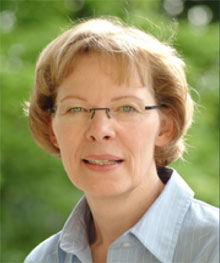 |
Louise Röska-Hardy, executive secretary of the European Society for Philosophy and Psychology (ESPP)
In one week your 23rd Annual Meeting of the European Society for Philosophy and Psychology (ESPP) will kick off. Please give us an idea about two or three topics to be discussed.
Social cognition, which concerns the processes involved in how individuals think about themselves and others, will be the focus of several lectures and sections. Questions concerning the role specific cognitive processes play in our social interactions will be discussed from different theoretical perspectives. One plenary lecture will present recent empirical research on the character of the neurocognitive mechanisms that enable cultural inheritance, e.g. social learning, imitation, mirror neurons, and so-called mind reading, the ability to grasp others’ psychological states.
Another topic concerns the recent movement in philosophy known as "experimental philosophy". This philosophical approach employs experimental methods usually associated with cognitive science to address the kinds of questions associated with philosophy, e.g. "What makes an action intentional?". Its proponents gather empirical data on what people actually think and decide when presented with specific scenarios. For example, recent research has investigated the impact of people's moral judgments on their intuitions about questions that might initially appear to be entirely independent of morality, e.g. questions about intention or causation. Given the "armchair" approach of most philosophers historically, the movement challenges traditional views of disciplinary boundaries.
First language acquisition and child bilingualism will be another topic of discussion. An account of first language acquisition must explain the child’s acquisition of the sound systems of his or her language or languages, i.e. their phonology. The emergence of the phonological system in the period of transition into language in the first and second years of life is the focus of multidisciplinary research. Recent linguistic studies on this period, utilizing infant speech perception techniques like the head turn paradigm and eye tracking, and acoustic analyses, will be presented.
Most people are aware of philosophy and psychology – as separate scientific fields. Why should philosophers and psychologists interact?
Actually, contemporary philosophy, psychology and linguistics investigate several common topics from different, disciplinary perspective – cognition, consciousness, human language, how we understand other people, to name a few. For philosophers working in the philosophy of mind or the philosophy of language, it’s important to be informed about empirical work. For psychologists and linguists it’s often fruitful to discuss and clarify conceptual issues with philosophers, who are trained to analyse concepts and arguments. One advantage of the ESPP is that attendees are usually well-versed in both theoretical and empirical issues. This makes presenting your research at the ESPP particularly rewarding, because discussions can take place at a high level of interdisciplinary expertise.
We are living in a more and more digitised world. How important is your annual meeting for the mission of ESPP?
The annual meeting offers researchers from psychology, philosophy and linguistics the opportunity to network and to discuss research interests that transcend disciplinary boundaries. A number of interdisciplinary European research projects and academic co-operations originated in cross disciplinary contacts established at an annual ESPP meeting.
Why did you choose Tartu as destination for 2015?
As a European society, we try to hold the annual meeting in a different part of Europe each year in order to facilitate attendance by researchers from different countries – especially early career researchers, who may not have access to resources for travel. This year we’re pleased to be able to hold our meeting at the University of Tartu in Estonia, one of the "newer" member states of the European Union.
What are the top three challenges for ESPP these days?
The major challenge is to maintain the over-arching, interdisciplinary character of the annual ESPP meeting in the face of numerous special focus workshops and conferences. At the ESPP meeting researchers can inform themselves about cutting edge developments in related fields and present their research for discussion and critique in an interdisciplinary forum. The interdisciplinary character of the meeting is also one of its greatest strengths.
A second challenge concerns the financing of general topic, interdisciplinary meetings. The economic situation of large national foundations has changed dramatically within the last 10 years and the funding available from national and state governments and ministries is limited. This poses a challenge not only for the ESPP, but for all scientific meetings that aim to present a spectrum of research from different disciplines.
The aim of the European Society for Philosophy & Psychology (ESPP) is to promote interaction between philosophers and psychologists on issues of common concern. Psychologists, neuroscientists, linguists, computer scientists and biologists are encouraged to report experimental, theoretical and clinical work that they judge to have philosophical significance; and philosophers are encouraged to engage with the fundamental issues addressed by and arising out of such work. In recent years ESPP sessions have covered such topics as attention, problems of consciousness, memory and time, hypnosis, and the interpretation of neuropsychological results. The 23rd Annual Meeting of the European Society for Philosophy and Psychology will take place from 14 to 17 July 2015 in Tartu, Estonia. www.eurospp.org, http://espp2015.ut.ee